ASMFC 2022 Winter Meeting- Summary
STRIPED BASS MANAGEMENT BOARD- January 26, 2022
The ASMFC Winter Meeting convened this past Wednesday, January 26 for what was largely a procedural meeting in advance of drafting Amendment 7 to the Striped Bass management plan. There were a few notable revisions to the Amendment which we discuss below.
There is some good news, most importantly, Draft Amendment 7 was approved to be released for public comment before the ASMFC meets for its spring meeting in May of 2022. Assuming approval, the plan will not go into effect fully until 2023. That is because state fisheries regulations are already in place for this year and some of the provisions will have to be formally adopted by various legislatures along the coast. That is the nature of process and more reason why greater urgency is needed to make a difference quickly.
Draft Amendment 7 will be released soon; we will then review and follow up with a full breakdown of the various sections and provide some direction on how to comment. There are four main issues the board approved for development in Draft Amendment 7; Management Triggers, Measures to Protect 2015 Year Class, Recreational Release Mortality and Conservation equivalency. What follows is our summary of the primary items discussed, the decisions made, and our position.
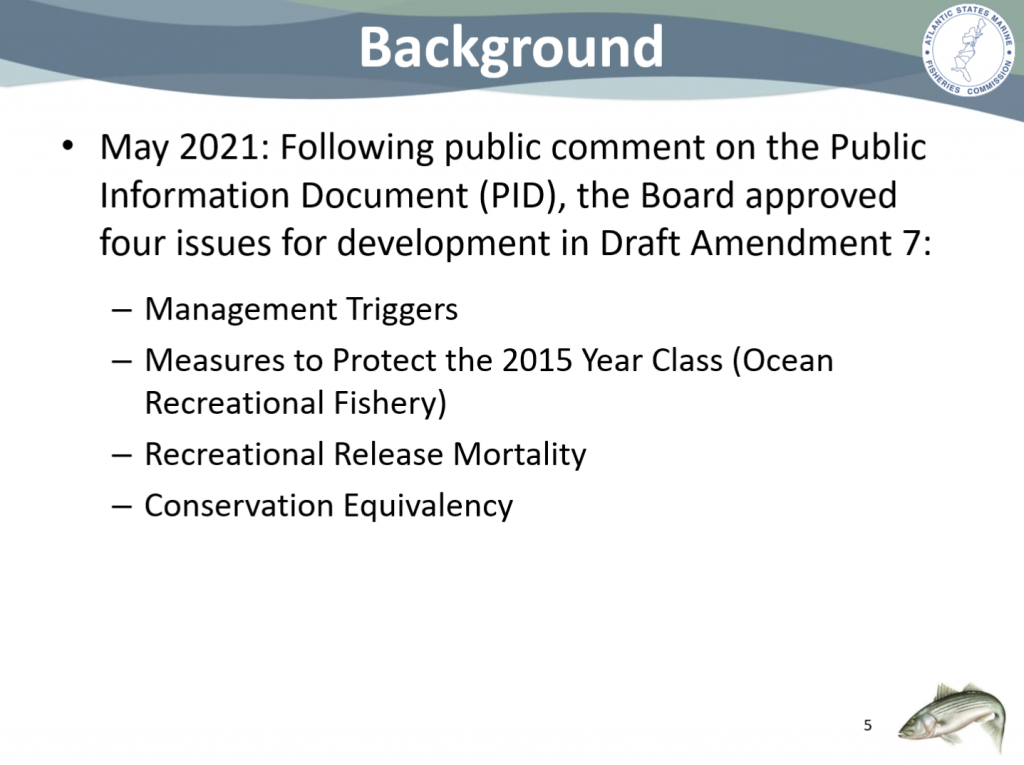
MANAGEMENT TRIGGERS
The first issue discussed was management triggers, this was a very complicated section. The CliffsNotes breakdown here is that this section could possibly delay action by the board by setting requirements for the timeline that triggers a rebuilding of the stock. As written, it would require 3 years of data to declare overfishing and kickstart a rebuilding plan. The consensus of the angling public is that the ASMFC has failed to move fast enough to recover the stock. As we have previously mentioned, the stock was declared overfished in 2018, a little over 3 years later and we are still working on a draft amendment. This section would only further delay action.
The good news here is that Megan Ware (ME) and John McMurray (NY) immediately voiced opposition and a motion was made to remove it from the draft amendment. The board needs to move as quickly as possible if there is any indication that the stock is in trouble and in our opinion, there is little downside to erring on the side of caution. The motion passed (10-6-0-0) and it has been removed, this is a real win for conservation.
YEAR CLASS PROTECTIONS
A recent addition to Draft Amendment 7 was protections for strong year classes (rec size and bag limits), more specifically for the 2015-year class. There is some data which suggests that this would not make a difference in the recovery of the stock, and that the ASMFC already missed its opportunity to protect the 2015-year class.. The Plan Development Team (PDT) suggested that this be removed and that is just what happened.
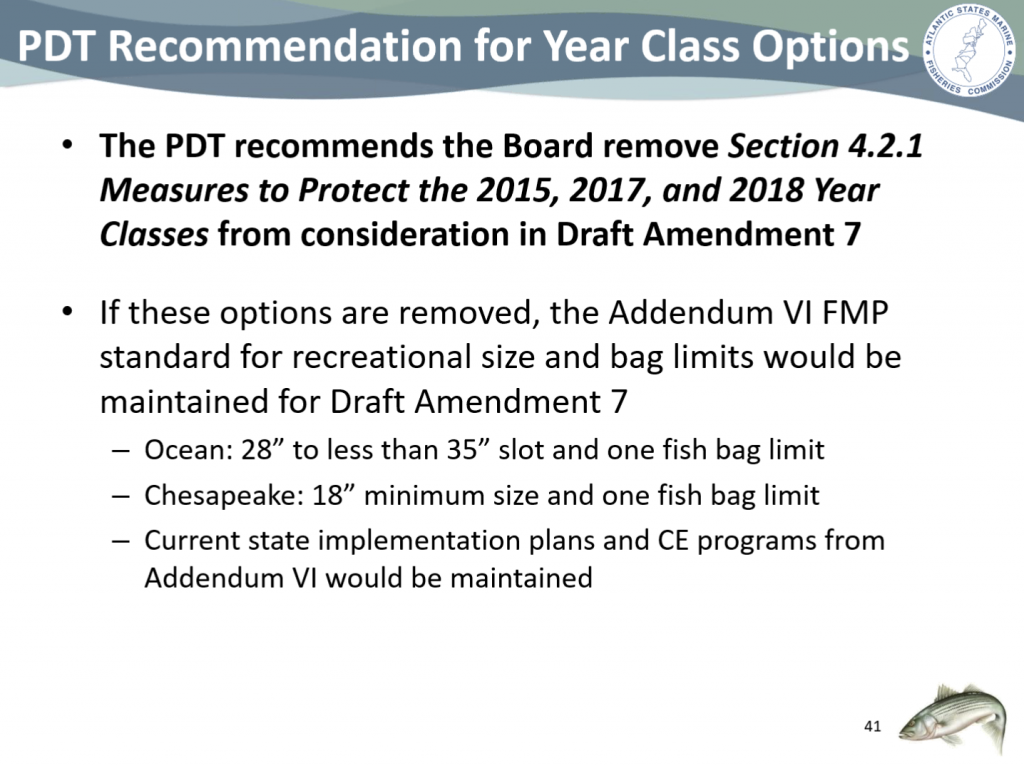
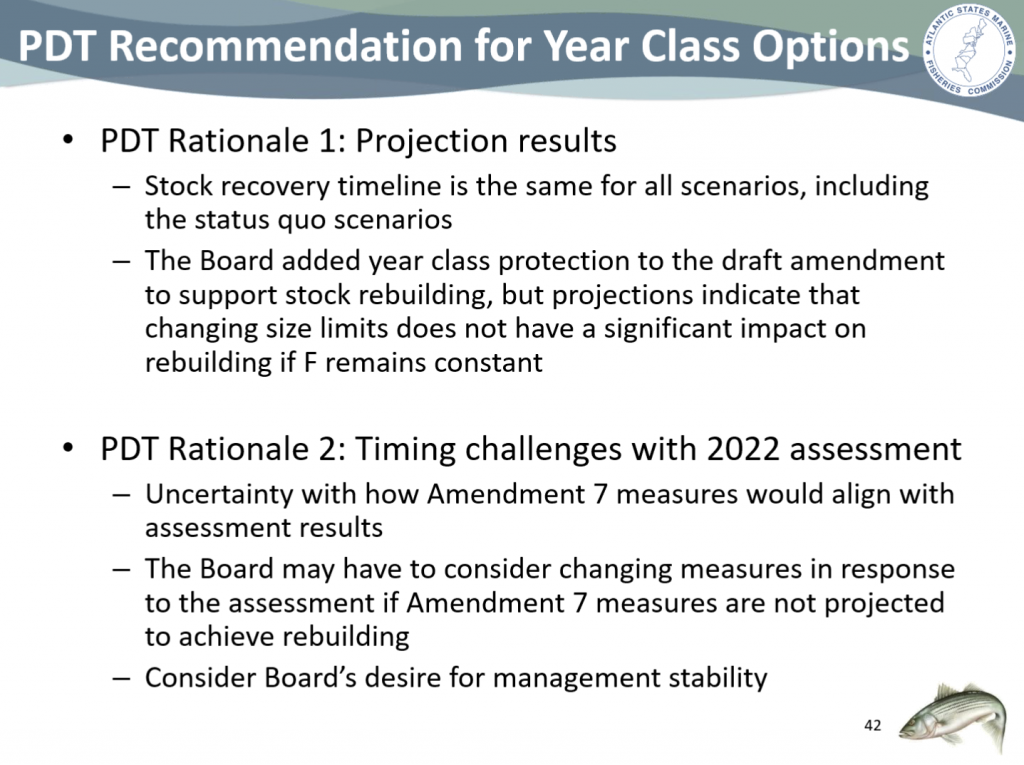
The prevailing opinion seems to be that, rather than protect a single year class, focus should be on better overall protection for all fish that run a harvest gauntlet as they migrate from the Chesapeake and up along the coast. If the idea is that stronger overall protections are needed, we support that. But we’ll see what the actual language is when the draft is made public before we offer a position for public comment.
CONSERVATION EQUIVALENCY (CE)
While there was no real discussion or changes made to the CE section of the amendment, there is an important and notable option we were all happy to see. As many of you already know there is consensus amongst almost every conservation organization that CE is often misused and abused, we would all like to see it off the table all together. While that is not the case there is some good news in the way of options B, C and D. With option B1, CE can be restricted if the stock is considered overfished, the SSB (spawning stock biomass) is below target or if overfishing is occurring. Options C and D offer restrictions based on MRIP data (needing to be more precise) and buffers to make up for the fact that CE effect can often be unquantifiable. In that case, a state applying for CE would essentially be hit with an additional reduction to make up for uncertainty of CE.
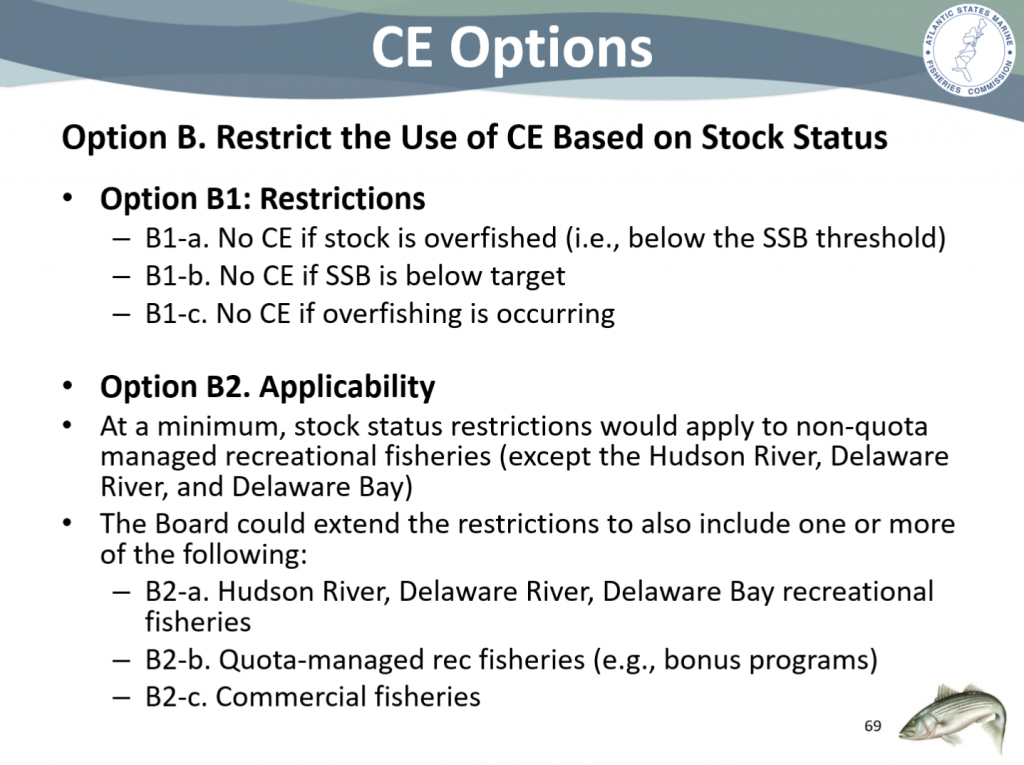
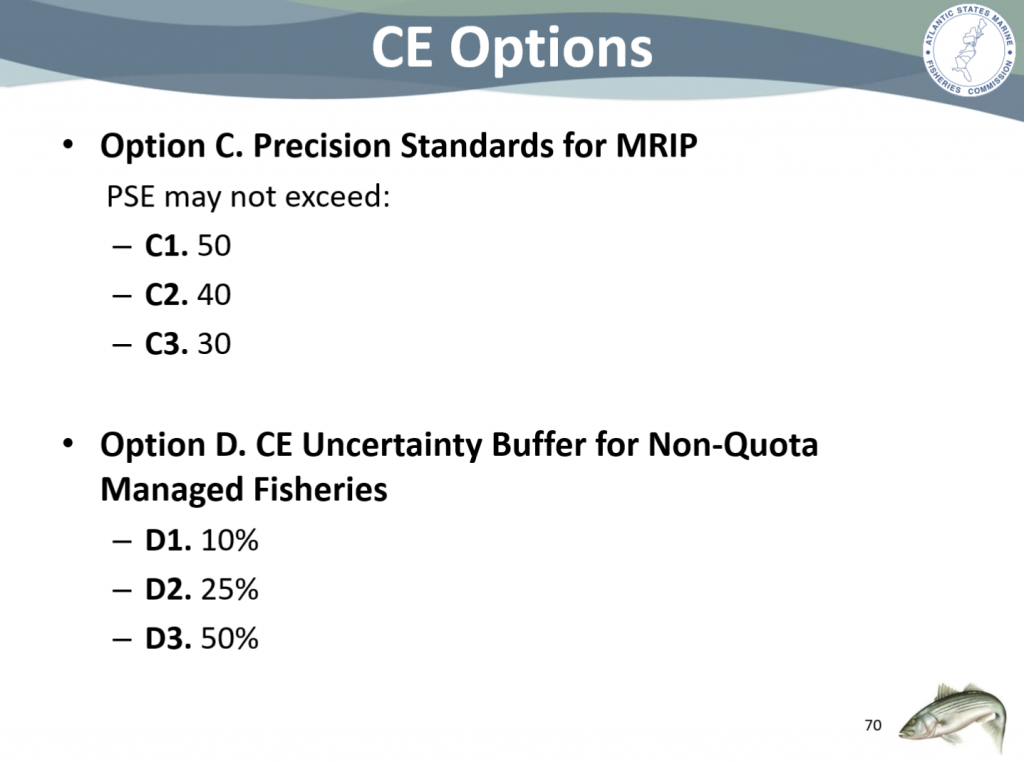
These options will be our only way to combat the misuse of CE and they will make states reconsider requesting it in the first place. We will go into more detail explaining each option when we give our summary and recommendations for comments on Draft Amendment 7. If we all rally together and speak up there is a real chance we can hit CE where it hurts and that is another win for conservation.
REBUILDING PLAN
As we have said on more than one occasion, the ASMFC is behind the 8-ball when it comes to rebuilding the stock within the required 10 years. The stock was declared overfished with overfishing occurring back in 2018, it is now 2022 and without the unknown variable of the October 2022 stock assessment it is unlikely that it will be rebuilt before 2029. The slide below shows what will happen if the stock assessment indicates that Amendment 7 as-is will be sufficient for rebuilding and what will happen if it does not. If Amendment 7 is unaffected by the assessment there will be no changes, if the rebuilding target will not be met then there would be a need for an addendum to achieve the rebuild.
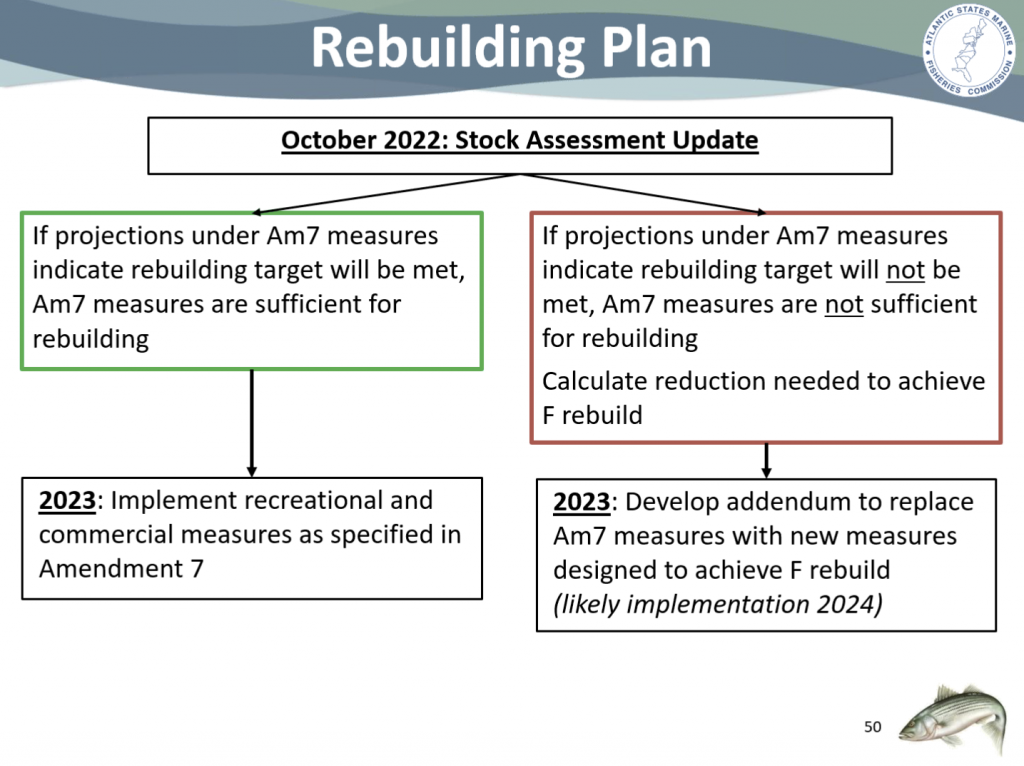
The inherent problem with the second outcome is that 2023 will be spent developing that addendum and regulations would likely not be put into place until 2024, if we are lucky. With the possibility of only five years to rebuild something had to give. That is when we saw the motion (below) from Mike Armstrong (MA).
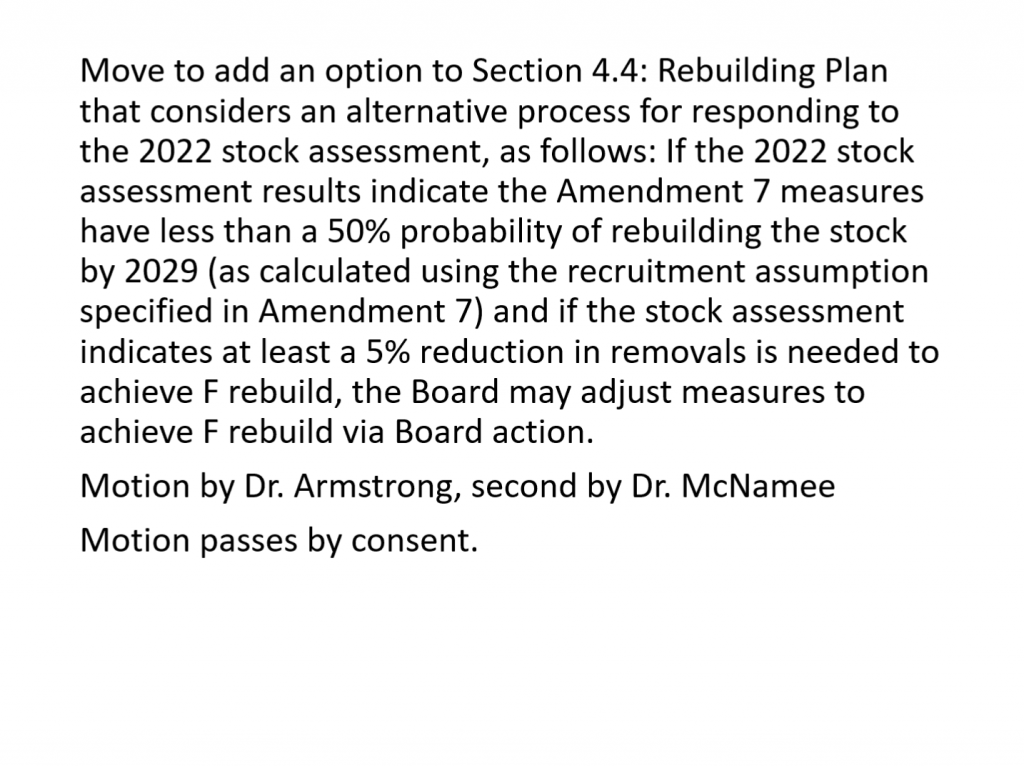
This is a one-time measure tied to the results of the 2022 stock assessment and would give the ASMFC the ability to adopt an immediate 5% harvest reduction while the full response to a potential stock emergency is drafted for consideration. Stripers Forever voiced support for this motion because it allows for decisive action in the event that the stock assessment indicates that Amendment 7 will not rebuild the stock by 2029. Thankfully the motion passed by consent of the board.
RECREATIONAL RELEASE MORTALITY
With the current mortality of recreational C&R fishing at 9% and a very large number of anglers choosing to fish (even when practicing catch-and-release), the overall impact on the stock is huge. As you see in the slide below, there are four options for helping to ease this burden on the stock.
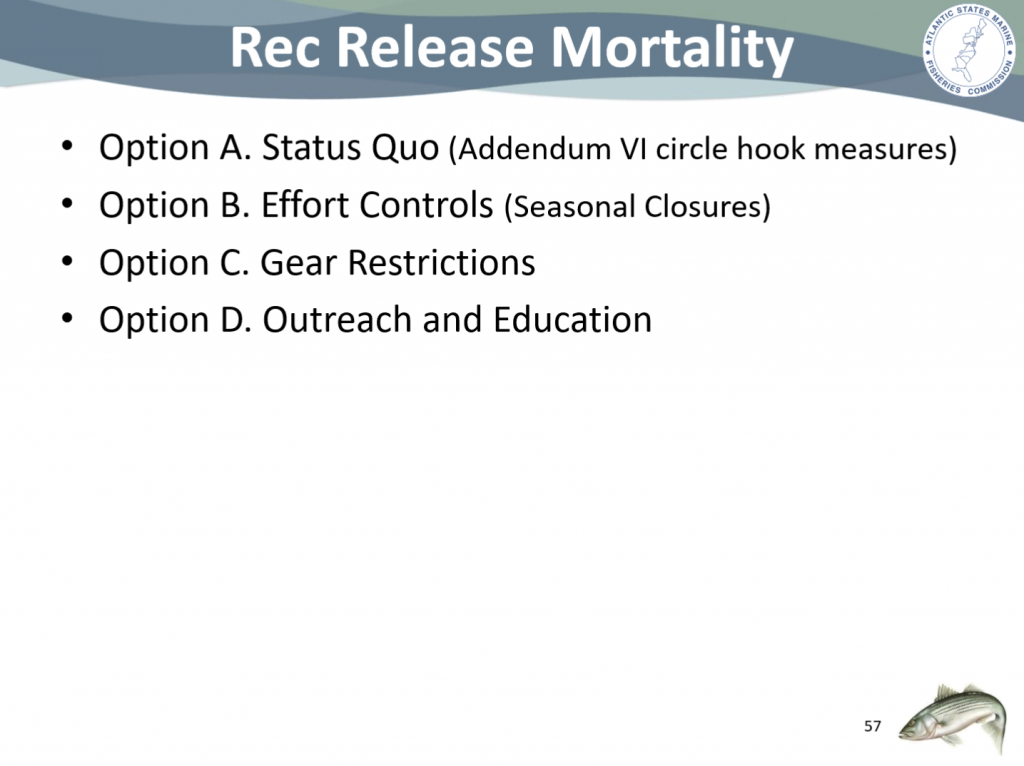
Option D, outreach and education, is a no brainer and we would expect little to no push back on support of this option. In our opinion this should a given and both the ASMFC and states should pursue this path, we have strongly suggested it in the past and we will ask that you do so again when the time comes to comment on Draft Amendment 7. Conservation organizations like Stripers Forever have been leading the way on angler education and for improving catch-and-release practice. Support from the ASMFC and individual states would be a welcome addition to the effort.
Where things get a little complicated and confusing is option B, effort controls (seasonal closures). If you fish or live near a major spawning area in the early spring you have probably been witness to the pressure put on these fish as they stage, spawn and then redisperse to continue their migration north. Each spring the NY bight is a prime example of this, and the fish take a beating, especially the large breeders as they stage in Raritan Bay, NJ. It does not take a scientist to come to the conclusion that if these fish were left alone their spawning success would increase. With the stock overfished and overfishing occurring any help is extremely important and we believe that the impact would be substantial.
Things start to go off the rails when it comes to defining these spawning areas. Seasonal closures to spawning locations would be left up to the states. This is both dangerous and confusing. While spawning areas and restrictions are well-defined in the Chesapeake, this is not the case in Delaware Bay or the Hudson River. It also leaves vulnerable fish that gather in places like Raritan Bay as New Jersey would likely argue that Raritan Bay is not a spawning ground.
While that debate continues, Raritan Bay is a staging area for stripers headed up the Hudson, and anglers targeting fish pre- and post-spawn would need to be considered. Any measure that is not regarded as equitable could undermine efforts to protect vulnerable fish. In addition, the board would be asking states like New York (Hudson River) and New Jersey (Raritan Bay) to work together to define this area and potential overlaps as described above. In the past this type of effort has not worked out and it would not be wise to attempt to go down that road again.
It is important that the board define these areas to remove the possibility of issues as described. We cannot leave it up to the states to determine where these closures should take place. When the time comes for public comment, we will dive even deeper into this issue and ask that you comment in favor of well-defined seasonal closures.
IN CONCLUSION
When the complete draft of Amendment 7 is made public (as announced today, on or before February 4th), we will review and provide guidance for the public comment period. We welcome your input and insight throughout this process. The public’s opinion has had noticeable effect on the direction of this Amendment, and members of Stripers Forever, who spoke boldly in favor of a ten-year harvest moratorium, has influenced the direction of Amendment 7.
Thank you for your continued support of Striped Bass and of Stripers Forever.
Taylor Vavra & Mike Spinney
ACTION ALERT- ASMFC Winter Meeting (1/26/22)
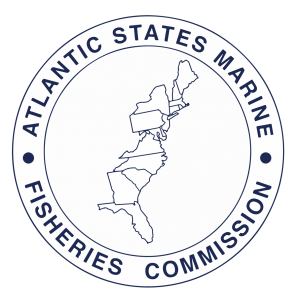
ACTION ALERT
ASMFC Winter Meeting of the Atlantic Striped Bass Management Board
1/26/22 | 1:30 – 5 PM EST
Back in March of 2021, the ASMFC published the Draft Amendment 7 PID. While we were hoping to have Draft Amendment 7 released for public comment after the October of 2021 meeting, that did not happen and the proverbial can was kicked farther down the road. There was much discussion and several major components of the amendment were edited, deleted and new sections were added (most importantly protection of the 2015 year class). We can expect to see more tweaking and revising of the draft amendment at tomorrow’s meeting. Here is the draft agenda/meeting overview (starting on page 83) for tomorrow’s meeting. (also at the bottom of this email along with a link to the supplemental materials) The webinar link is below, anyone can join and we strongly encourage you to be part of the process.
Striped Bass were declared overfished with overfishing occurring back in 2018 with the stock assessment accepted by the board in 2019. As you can see below the current schedule for a finalized Amendment 7 is May 2022. With 2022 regulations already in place, states will likely not implement the revised Amendment 7 regulations until 2023. The recovery of the Striped Bass stock is behind schedule based on the required 10 year rebuilding requirement and we need action to be taken ASAP. The recovery of the Striped Bass stock is behind schedule based on the required 10 year rebuilding requirement and we need action to be taken ASAP. While this is a long process, it is a necessary one, we need an amendment that will bring the best possible outcome for the stock. Please do your best to stick with it, when the time comes for your voice to be heard we will surely let you know.
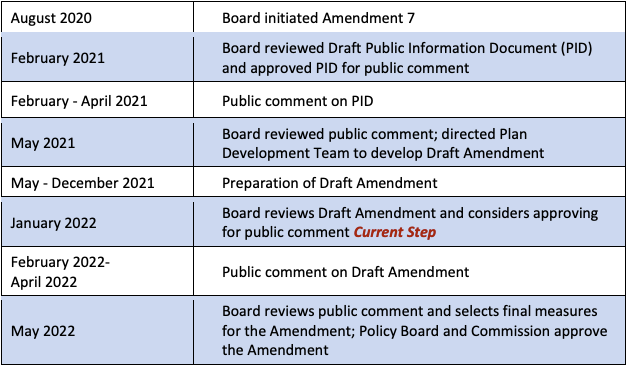
Tomorrow (1/26/22 – 1:30 – 5 PM EST) the ASMFC will hold its winter meeting of the Atlantic Striped Bass Management Board and consider Draft Amendment 7. This will be a consequential meeting and we strongly encourage all who can, to attend and pay close attention. The hope is that this meeting will lead to Draft Amendment 7 being released for public comment. At that time it is all hands on deck, we will all need to do our part to protect the fish we love and speak up louder than ever before. We will do our best to inform our members and followers of what is on the table and offer some guidance in how to comment on Draft Amendment 7.
To register for the live webinar please go here: ASMFC 2022 Winter Meeting
Thank you!
ADDITIONAL LINKS
- Atlantic Striped Bass Board- Draft Agenda/ Meeting Overview/ Main Meeting Materials
- Atlantic Striped Bass Board- Supplemental Materials
ACTION ALERT- ASMFC Fall Meeting
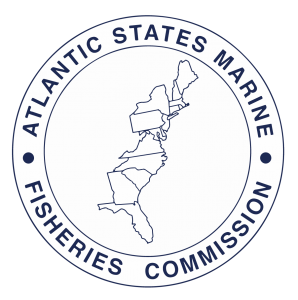
ACTION ALERT
ASMFC Fall Meeting of the Atlantic Striped Bass Management Board
Back in March, when the ASMFC published the Draft Amendment 7 PID, we made the hard call to suggest a harvest moratorium for both the recreational and commercial sectors. This was not something we rushed to judgement on and it came with much discussion and deliberation. We still believe it is the right call and the only foolproof way to restore the Striped Bass stock. Fast forward to today and the recently published Chesapeake Bay 2021 Young-of-Year survey results and that decision makes more sense now than ever before. (see graph below) For the third straight year the YOY number is scary low, this year hitting just 3.2, a dismal result and a bad sign for the overall health of the stock. We need strong conservation action and we need it right NOW.
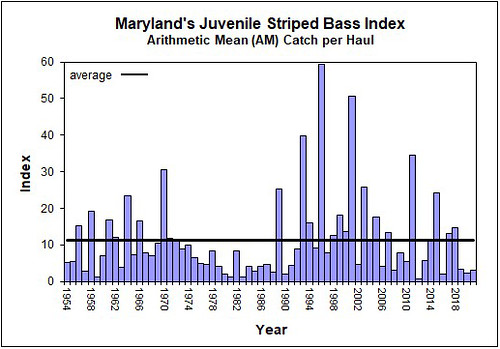
Tomorrow (10/20/21) the ASMFC will hold its fall meeting of the Atlantic Striped Bass Management Board and consider Draft Amendment 7. This will be a consequential meeting and we strongly encourage all who can, to attend and pay close attention. It is likely that this meeting will lead to Draft Amendment 7 being released for public comment. At that time it is all hands on deck, we will all need to do our part to protect the fish we love and speak up louder than ever before.
To register for the live webinar please go here: https://attendee.gotowebinar.com/register/180425878123839504 (Webinar ID: 349-122-851)
Thank you!
ADDITIONAL LINKS
- Atlantic Striped Bass Board- Draft Agenda/ Meeting Overview/ Main Meeting Materials
- Atlantic Striped Bass Board- Supplemental Materials
The Striped Bass Fishery In Our Hands
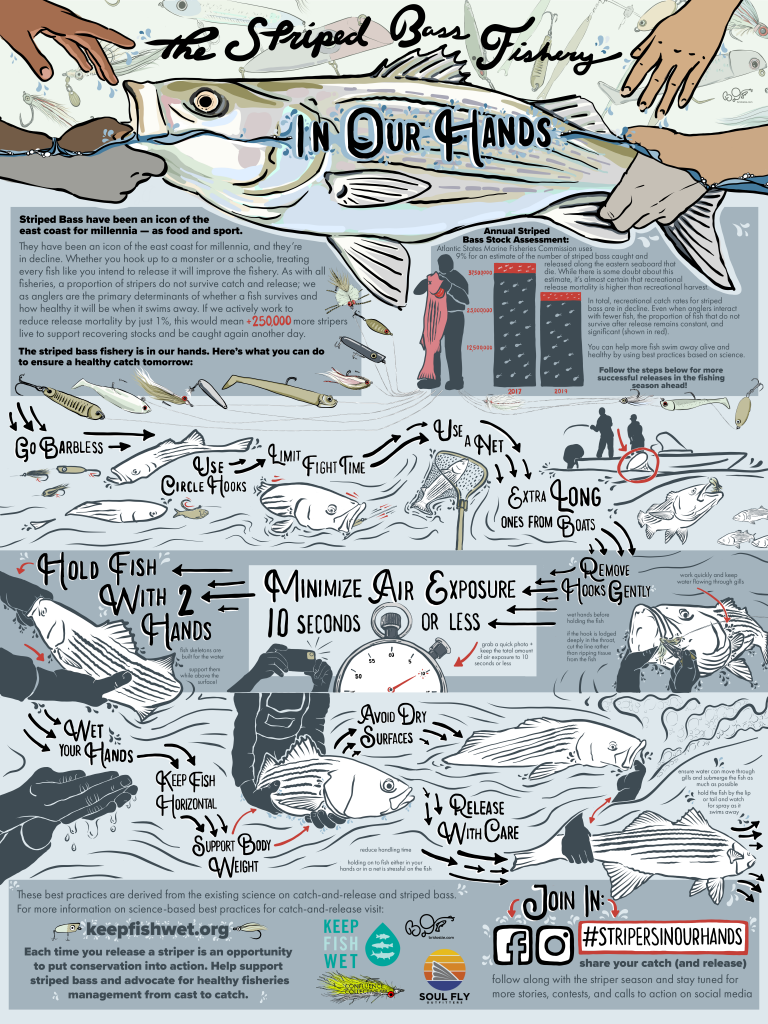
Our friends and conservation partner Keep Fish Wet have teamed up with Confluence Collective, Soul Fly Outfitters and Maine based artist and angler Bri Dostie to develop a grassroots campaign to help address recreational catch and release mortality.
The Striped Bass fishery is one of the most popular recreational fisheries in the United States. The most recent ASMFC stock assessment released in 2019 showed that over 41 million fish were caught in the recreational fishery. And as striped bass anglers travel, fish, and shop along the east coast, they inject millions of dollars into local economies.
Currently, Striped Bass populations are at a 25 year low according to the Atlantic States Marine Fisheries Commission. While commercial harvest has decreased somewhat and the recreational harvest has been declining steadily since 2015, it’s estimated that the largest portion of mortality in the fishery comes from fish that are caught and released but do not survive. This is where recreational anglers have the ability to play a significant role and create positive change.
Scientist quote: “Just saying practice catch-and-release isn’t good enough, since not all fish that are released survive,” said Dr. Andy Danylchuk, Professor of Fish Conservation at UMass Amherst, and Science Advisor for Keep Fish Wet. “Fortunately, there is a growing body of science showing anglers can making subtle changes in their behavior and how they catch and handle fish that can reduce release mortality and make a meaningful impact of the fishery we all care about”
“If you choose to release a fish and you would like that fish to live and remain healthy, there are some simple science-based steps you can take,” says Sascha Clark Danylchuk, the Executive Director of Keep Fish Wet. The three most important things you can do are to:
- Minimize air exposure
- Avoid dry surfaces
- Release with care
“Scientists know a lot about how human interactions affect the fish we catch, but that information doesn’t help anyone if it stays in a journal article behind a paywall,” said Dostie. “We wanted to make sure every angler is empowered with the information they need to protect the fish they care about — and art is one way to share that information more broadly.”
The Striped Bass fishery is in our hands. We as anglers have the opportunity to improve survival rates by taking care of every fish we encounter. Take these science-informed best practices for handling fish into consideration next time your on the water:
- Consider going barbless for smooth hook-ups and clean hook removals. If you’re using live bait, use circle hooks.
- Limit fight time: every second on our line adds stress and takes energy from the fish, leaving them with less for recovery.
- Use a net: this can bring fish in fast and is especially helpful when fishing from a boat. Rubberized nets are best, as they do less damage to fins and slime. By using a net we can also keep the fish submerged while removing the hook safely.
- Remove hooks gently: if needed use a tool and cut the line if deeply hooked.
- Minimize air exposure and Avoid Dry Surfaces: 10 seconds out of the water in total, just enough time to remove that hook, snap a quick photo, and prepare for release.
- Hold fish with 2 wet hands to support their weight out of the water, keeping the fish secure while not removing too much protective slime.
- Holding fish horizontally helps avoid damage to the skeletal and organ systems.
- Release with care! Holding a fish by their lip or tail is best, making gripping tools irrelevant. Only revive fish that cannot swim on their own.
The state of the fishery is truly in our hands, even a small improvement in catch and release mortality would have a huge impact in the overall health of the stock. For more information please check out the Stripers In Our Hands page on the Keep Fish Wet website.







